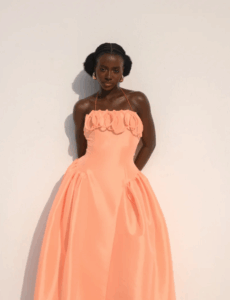The Nigerian fashion industry is no stranger to imitation. Everybody wan dey do copy and paste like it’s a school assignment. But lately, the conversation around originality has gotten louder, thanks to a hot wave of “inspiration gone wrong,” with the Veekee James vs. King Corset saga leading the headlines.
In an industry where some designers treat Pinterest and Instagram like their personal mood boards, the normalization of replicating original designs without credit is a growing concern. It’s now a conversation about creative integrity, soft stealing, and how cultural capital is being played like a card game.
In this piece, we explore this growing issue and spotlight some of the most blatant cases of plagiarism in the Nigerian fashion industry.
Veekee James vs. King Corset: A Defining Flashpoint of Copy & Paste Chronicles.

Veekee James dress King Corset
This one no be hearsay. Recently, Nigerian designer Veekee James shook the table (and broke the internet) when she accused Senegalese designer King Corset of copying her signature floral dress design that was created for South African media icon Bonang Matheba during Miss South Africa 2024. Veekee unveiled a jaw-dropping dress and became widely celebrated for its craftsmanship as it screamed elegance and captured the essence of femininity. Senegalese designer King Corset said, “Nice dress, let me just… photocopy it.” He released a strikingly similar design complete with a mini-documentary and behind-the-scenes footage, it sparked online outrage. No shout-out. No tag. Just pure copy-paste energy with confidence.
Veekee took to Instagram and said:
“Some of you designers in this industry are moving MAD. Like seriously mad! How on earth do you copy someone’s viral design 100% and have the guts to do a documentary?”.
The backlash forced King Corset to publicly acknowledge Veekee as the original creator as Veekee fans didn’t let it sit out. But while public opinion sided with Veekee, the situation exposed a long-standing rot in the fashion scene where originality gets stolen in broad daylight.
A Culture of Unchecked Replication
Plagiarism in fashion? Old news. What’s changed is how visible and often shameless it has become. In this digital world where a design can go viral in minutes, creatives are literally racing against clones of their own work. Some designers have become faux plugs, recycling what they find online and passing it off as their “signature piece.”
Desirée Iyama, CEO Luminee, Ugo Monye, and brands like Trish O Couture have all been embroiled in similar disputes. In each case, the common denominator is a lack of unchecked replication. While designers may shame copycats publicly, few have legal pathways to reclaim ownership or seek redress.
Let’s highlight a few shameless throwdowns from the fashion trenches:
The Meraki dress by Desirée Iyama.
Desirée Iyama, who called out an emerging designer for copying her signature silhouette down to the fabric. The designer said “inspired by,” but abeg, we all know that’s a camouflage for plagiarism.

Nandi Mbatha Ceo Luminee
Quiteria Atelier vs. CEO Luminee, where South African designer Quiteria accused Luminee of stealing his design with identical styling and hairstyle. Luminee dropped a gown. South African designer Quiteria said, “Ma, didn’t I release this last week?” He made it for Nandi Mbatha, Luminee without any iota of creativity even copying the model’s hairstyle. Ahhh! Just full-on copy-paste with extra confidence.
Ebuka Obi- Uchendu
Ugo Monye, known for his iconic “Reale” agbada went viral after Ebuka rocked it, and subtly shaded rival designers who duplicated the look without giving credit during fashion week.
Fashion Politics: The Big Name Advantage
Here’s the gag, smaller designers are the ones who suffer most. When they are copied by bigger brands or celebrities, they often lack the influence to push back or fight the system.
But when the designer has a following, like Veekee, the public becomes the judge and jury. Social media drags, reposts, and rants become a form of digital justice. But not every designer has the luxury of noise.
So again, we ask, is public dragging enough?
What Needs to Change (Before People Start Watermarking Gowns)
The Veekee James incident is a flashpoint, but it cannot be the endpoint. For the Nigerian fashion industry to uphold its creative integrity, it must invest in Legal literacy for designers, so they understand their rights and how to protect their creations. Before one oversabi designer will replicate their work and use “inspiration” as a disguise for theft. The fashion industry should develop norms and ethics around citation, credit, and originality. Originality must not only be protected. It must be respected.
Final Word: No More Copy with Confidence
Originality should not be up for debate.
You can be inspired but don’t be a thief in designer clothing.
Because as we’ve seen with Veekee James, the internet has receipts. And once the dragging starts, even apology reels won’t save you.







